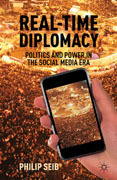
Real-Time Diplomacy. explores the media's role in the process of political change. As a backdrop to the events of 2011, this book examines how diplomacy has evolved as media have gradually reduced the time available to policy makers.It analyzes the workings of real-time diplomacy and the opportunities for media-centered diplomacy programs that bypass governments and directly engage foreign citizens. The book also discusses the ways that lessons from recent electoral campaigns - such as Barack Obama's use of social media in his 2008 presidential race - are applicable to emerging democracies around the world. Also examined are the root causes of the public anger that led to revolution: the social inequities, out-of-touch autocrats, repressive tactics, and other factors that were the tinder set afire by media's sparks. INDICE: PART I: 2011 .The Political Revolution .The Media Revolution .PARTII: DIPLOMACY TURNED UPSIDE-DOWN.Traditional Diplomacy and the Cushion of Time .The Arrival of Rapid-Reaction Diplomacy .The Expeditionary Diplomat and theCase for Public Diplomacy .PART III: SOCIAL MEDIA AND POLITICAL CHANGE.The Promise of Networks .Ripple Effects .Looking Ahead.
- ISBN: 978-0-230-33942-2
- Editorial: Palgrave Macmillan
- Encuadernacion: Cartoné
- Páginas: 212
- Fecha Publicación: 25/05/2012
- Nº Volúmenes: 1
- Idioma: Desconocido
